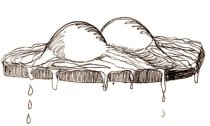Anne Bradstreet’s
“To My Dear and Loving Husband”
If ever man were loved by wife, then thee.
If ever wife was happy in a man,
Compare with me, ye women, if you can.
I prize thy love more than whole mines of gold,
Or all the riches that the East doth hold.
My love is such that rivers cannot quench,
Nor ought but love from thee give recompense.
Thy love is such I can no way repay;
The heavens reward thee manifold, I pray.
Then while we live, in love let’s so persever,
That when we live no more, we may live ever."
My Analysis
This poem was written in the early 1640s,
a time long before women were treated as legal equals to men. Anne, being an educated woman and praised for her intelligence, may very well have resented her status in life, forever bearing the title of “wife.” And though Anne did not write many poems regarding her domesticity, The book by Wendy Martin (comparing three women authors of early America) attests to Anne’s place in society as subordinate, regardless of her wit and skill as a poet.
This gender-based social role of women at the time,
or a Feminism critique, and the cultural imagery/symbolic critique of Anne’s poem (alluding to the East Indian Trade/Puritan culture) together create two lenses with which to view Anne’s poem closer.
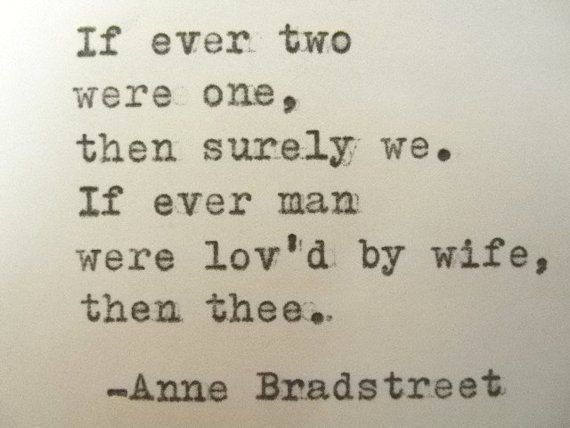
The author’s desires and intents are better placed after learning more about her,
compared to other women and the culture surrounding her. Wendy Martin goes onto inform us of such in her book.
Being the daughter of such a man,
while exposed to the great library at Lincolnshire, Anne was afforded opportunities most other women of the time were not. In 1630, when the oppression of religion became too great, Simon Bradstreet, other Puritans, and eighteen year old Anne, chartered a voyage to Massachusetts Bay, aboard the Arbella.

Looking closely at the first 3 lines of Anne’s poem,
each line builds on the previous to create a symbolic trine. “If ever two…/If ever man…/If ever wife…” Together they symbolize the trinity of love, as separate identities plus the identity of their couple. This reassures that love is felt by the narrator for the subject of their affection...
And why wouldn’t she love her husband,
her Father’s assistant to the Lincolnshire estate’s library, who soon swept her up on a journey and venture to pursue the highest of desires? Who bore with her eight children in all? Who seems to have their family’s best interests at heart even after several moves across the country, through hardships unknown? Though Anne may truly love her “man,” considering she dares other women to deny it in line four, her experiences prove that at times it must have been difficult.
Anne’s repetitive use of the word “ever”
throughout the poem creates an intonation of immortality, which is reinforced by the final two lines, alluding to love even after death. Upon closer analysis of these first few lines, however, a different view is revealed. Note that the use of the word “man” (instead of the title of husband) juxtaposes “wife,” leading to the question: Does she put herself below her husband in status, or is she referring to him as less than married by addressing him by his sex?
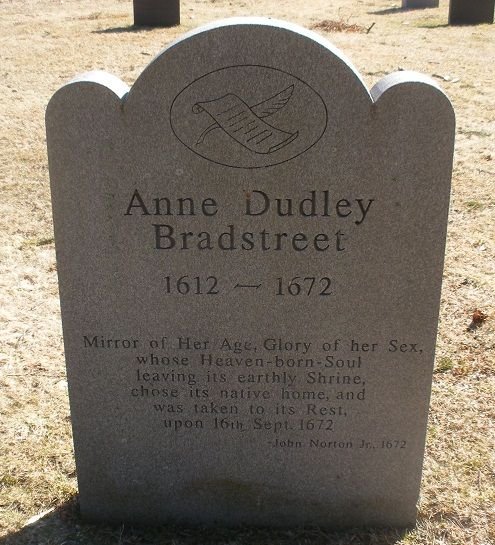
During this time period it was unacceptable for a woman to divorce,
she had no way of leaving her husband. Her poetry was a way to express her thoughts and emotions in a way that was viable. She did this in literary form, essentially immortalizing her love in this poem, even after death. Martin again attests to Anne’s wit and guile in desiring this to come true.
The cultural criticism comes into play
with Anne’s reference to “mines of gold/Or all the riches that the East doth hold” on line five and line six, inferring that she loves him despite his choices, despite her lack of choices, despite what other Earthly desires may be present at the time.
The present culture symbolized by her references
makes it easier for other women of her time to relate. Many men sought after the new found treasures of East Indian trade routes, including gold mines found in America and other new lands. Anne was one of many women who, forced to comply with their husbands, bore the years of these wild, wandering lusts.
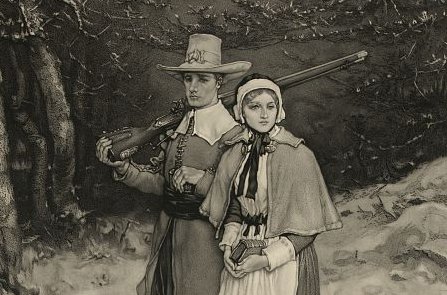
Lines seven and eight echo this greater-than-herself
force sweeping her up and along, “such that rivers cannot quench/…from thee, give recompense.” A bit of irony in the voice of the narrator is revealed when she ends with the word ‘recompense’. Here she is alluding to the fact that he could never make up for all the pain and suffering she has felt.
She states that she “can no way repay,” him
for the love he has shown her, or, ironically, for the suffering he has caused her. Still though, for them to make it through all the hard times, shows that there may be a chance to imagine that love will conquer all.
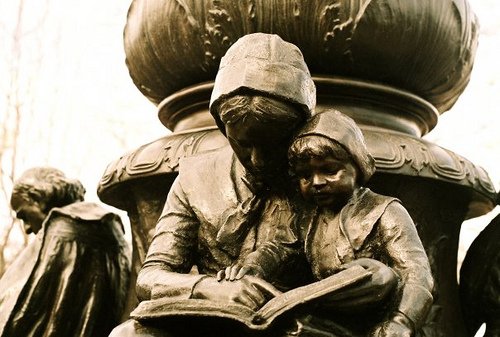
The last two lines of her poem reinforce the author’s desire
to rise above just the “wife” status. She uses the strong symbolism of their love, whatever it may entail, and makes it great and immortal, and winning. She uses her love for him, in this poem, to echo her skill and wit as a poet.
Her cultural sensitivity, intelligence, and experiences
set her apart from the other women of her time. Her feminist view, and her subordinate role as loving wife, expresses much of society at the time. Both Anne’s use of cultural symbolism and her views as a woman in this poem, make for an interesting analysis.
What do YOU think?
Work Cited
Martin, Wendy. "I Found a New World" An American Triptych: Anne Bradstreet, Emily Dickinson, Adrienne Rich. U of North Carolina, 1984. 21, 23, 31. Print.
*This block is the sole property of Robyn Eggs. Essay has been modified to fit blockchain format. Originally written Spring 2015 for American Public University. Please feel free to share with your friends and neighbors.
Follow @robyneggs for more eggsciting content!

